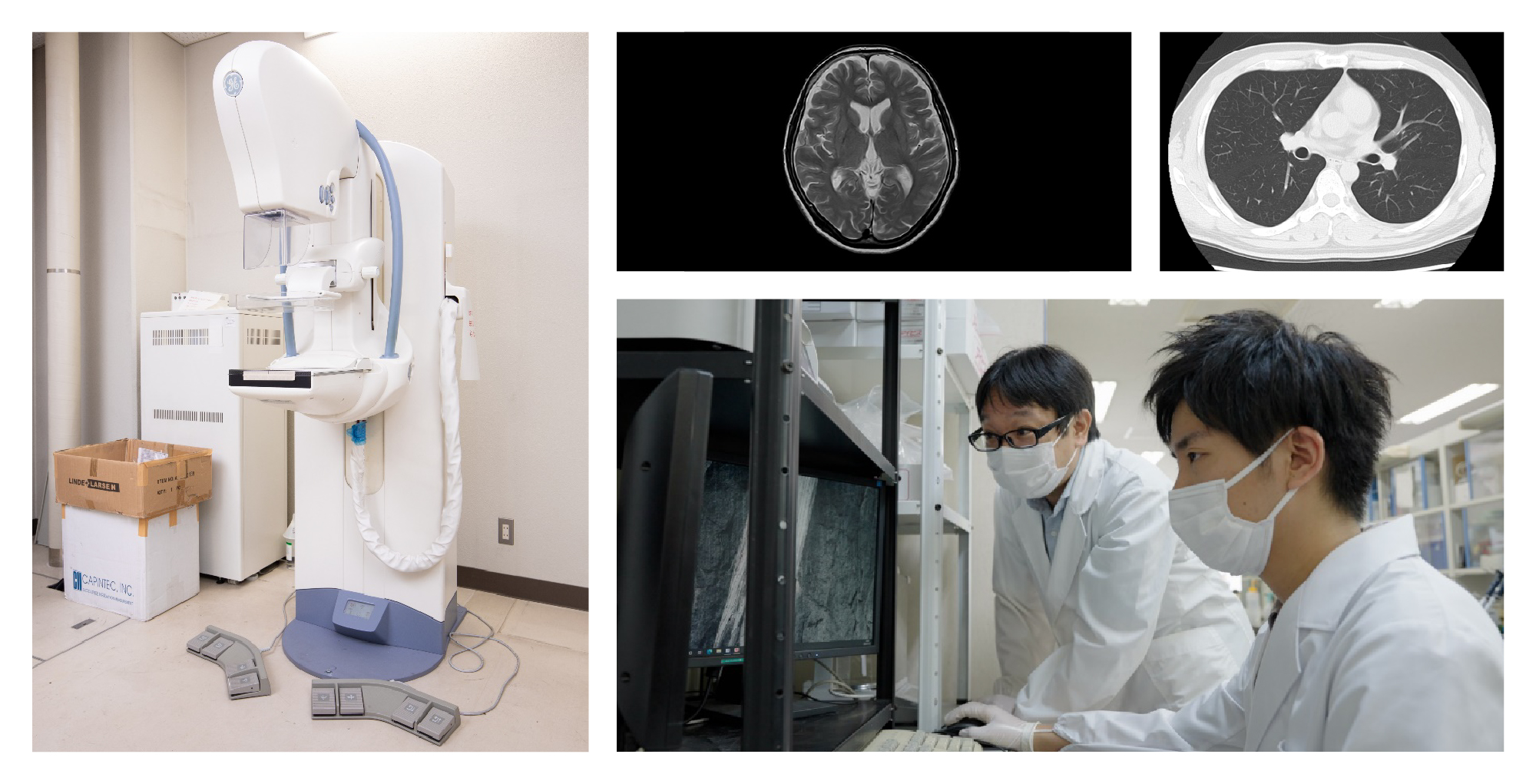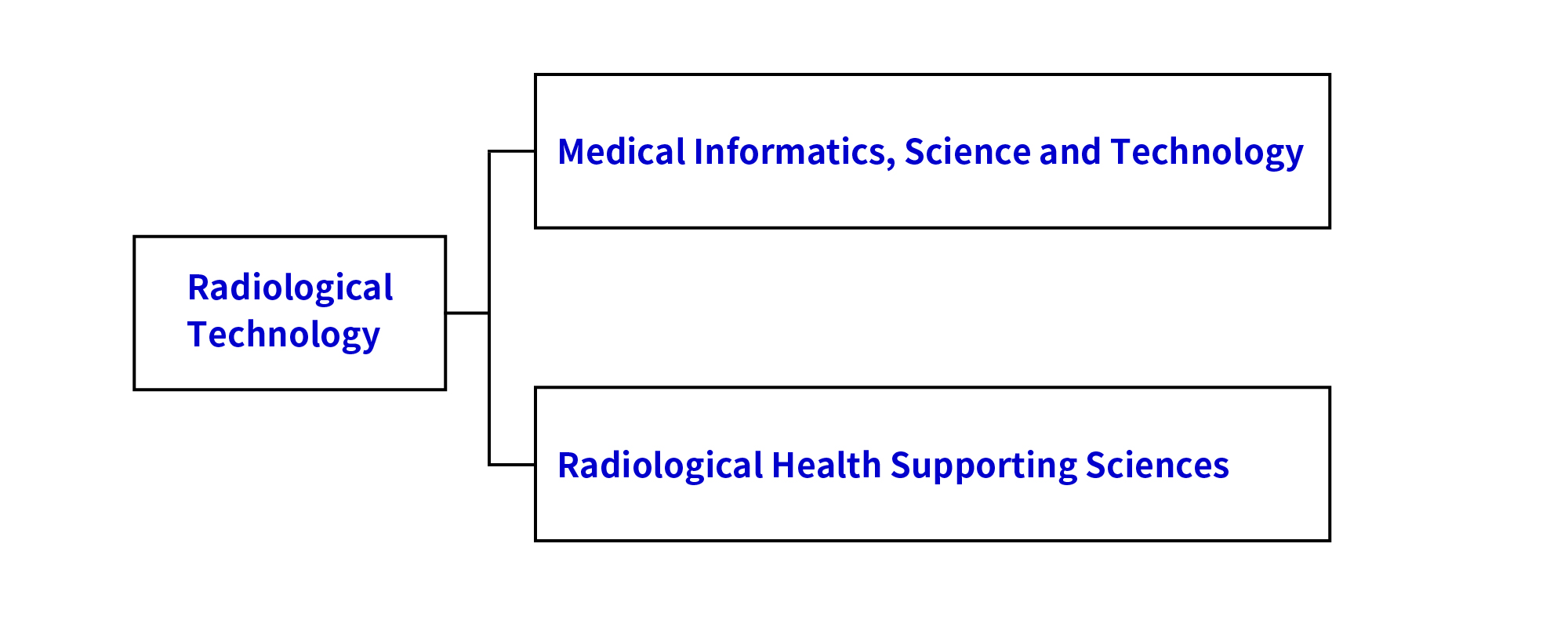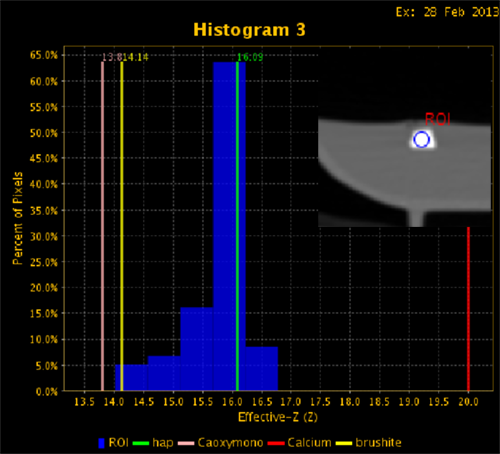Description of graduate studies
GRADUATE
SCHOOL OF
RADIOLOGICAL
TECHNOLOGY
放射線技術科学分野

OVERVIEW
Overview
In the field of radiological technology, the aim of the Graduate School of Health Sciences is to nurture medical technicians, researchers and educators who have mastered skills and expertise as highly specialized professionals, who have acquired the abilities to apply these skills and expertise in an integrated manner, autonomously search for the truth based on unique ideas, and exercise leadership in the world of healthcare and in team medical care.
Programs offered in the Master’s Course include medical physics, bio-information measurements, and medical imaging and diagnostic imaging technology in the area of Medical Informatics, Science and Technology. Also radiation life science, radiotherapeutic technology, nuclear medicine technology and radiological health science in the area of Radiological Health Supporting Sciences.
Programs offered in the Doctor’s Course include medical physics and medical image analysis and diagnosis in the area of Medical Informatics, Science and Technology, as well as radiological technology and radiological life and health science in the area of Radiological Health Supporting Sciences.
The Graduate School has also set up a number of special courses: Medical Physicists Course in 2008, Radiation Safety and Applied Radiology Course (Master’s Course) in 2009, and Radiation Safety and Applied Radiology Course (Doctor’s Course) in 2010. These courses have been completed by many students, including some who enroll while continuing to work full-time.
The Department of Radiological Technology consists of the following two academic fields.

Academic field of Medical Informatics, Science and Technology

In this academic field, we are conducting research to apply physical information obtained from the human body to medical technology. Physical information refers to the radiation that has passed through the human body and the potential difference and resistance in the body. We analyze the information, evaluate the image quality of radiographic images used for diagnosis, and aim to provide good images. In addition, we are researching applications to medical devices, such as measuring motor function by analyzing biological electrical signals and observing immune function from skin resistance.
As other research, we are conducting research on measurement of radiation exposure and research on new X-ray generation methods. We are also working on big data research and deep learning, which have recently become hot topics. Our research field is to deal with phenomena related to medical physics.
Academic field of Radiological Health Supporting Sciences

In this academic field, we are mainly conducting research on the effects of radiation on the human body. The types of radiation to be handled are extremely wide ranging, including those that are artificially generated and those that exist in the natural world.
Especially in the field of radiation therapy, we are conducting research on improving treatment accuracy and research on QA of treatment equipment. We believe that these studies will increase the effectiveness of cancer treatment and improve the quality of life of patients.
We also conduct research on public health related to radioisotope. Among them, we are clarifying that low-dose radioisotope contributes to health promotion. Radioisotope is considered dangerous, but when handled correctly, it can have beneficial effects on the human body.
Furthermore, we are conducting research on treatment methods guided by diagnostic imaging equipment. We aim to improve treatment results by developing new devices and making full use of image processing.
Please refer to the "researchmap" for each faculty member's research achievements and their websites for more detailed information on their research.
COURSE
Course
Graduate Programs
Advanced Practice Research Course (Master’s Program)
For this course, you will first choose between two areas. Then, you will take specialized courses in your chosen academic field. In addition, common and core subjects are taught together with students from other academic fields. In that subject, you can acquire a wide range of knowledge related to medical care outside your academic field of specialization. Students aim to complete the course by writing a thesis in their final year.
(Advance Course registration)
Cancer Radiation Science Course (Medical Physicist Course)
This course is specifically focused on cancer treatment. However, in addition to radiation therapy, you will learn about various approaches to cancer treatment, such as chemical treatment and palliative therapy. After completing the course, students will be eligible to take examinations for medical physics. Medical physicists are playing a leading role in solving physical and technical problems in modern medicine. The 2008 International Standard Occupational Classification (ISCO-08) published by the International Labor Organization (ILO) corresponds to the “medical physicist” classified as part of the physicist and astronomer, and the “scientific physicist”. Apply knowledge to 'industrial, medical, military and other fields of astronomy'. This makes the course especially suitable for those who wish to study radiation therapy professionally.
Neutron Medicine Course
This is a course to learn radiation therapy using neutrons, which is currently being actively researched. In particular, you will learn about the newest radiation therapy called Boron Neutron Capture Therapy (BNCT). In addition to classroom lectures, facility tours are also held at the Kansai BNCT Medical Center. This course is designed to train human resources who will be involved in the latest medical care.
Advanced Research Course (Doctoral Program)
In this course, we aim to acquire more advanced and deeper knowledge than in the first semester. Lectures are highly specialized. This course also includes lectures on inter professional work. In this lecture, you can learn the skills and ways of thinking necessary to achieve a common goal in a multidisciplinary team together with faculty members and students from other academic fields. This knowledge will be necessary to demonstrate leadership in the medical field.
Unlike master's courses, students are given ample time to devote themselves to research. Students aim to complete the course by writing a thesis by the end of their final year.
